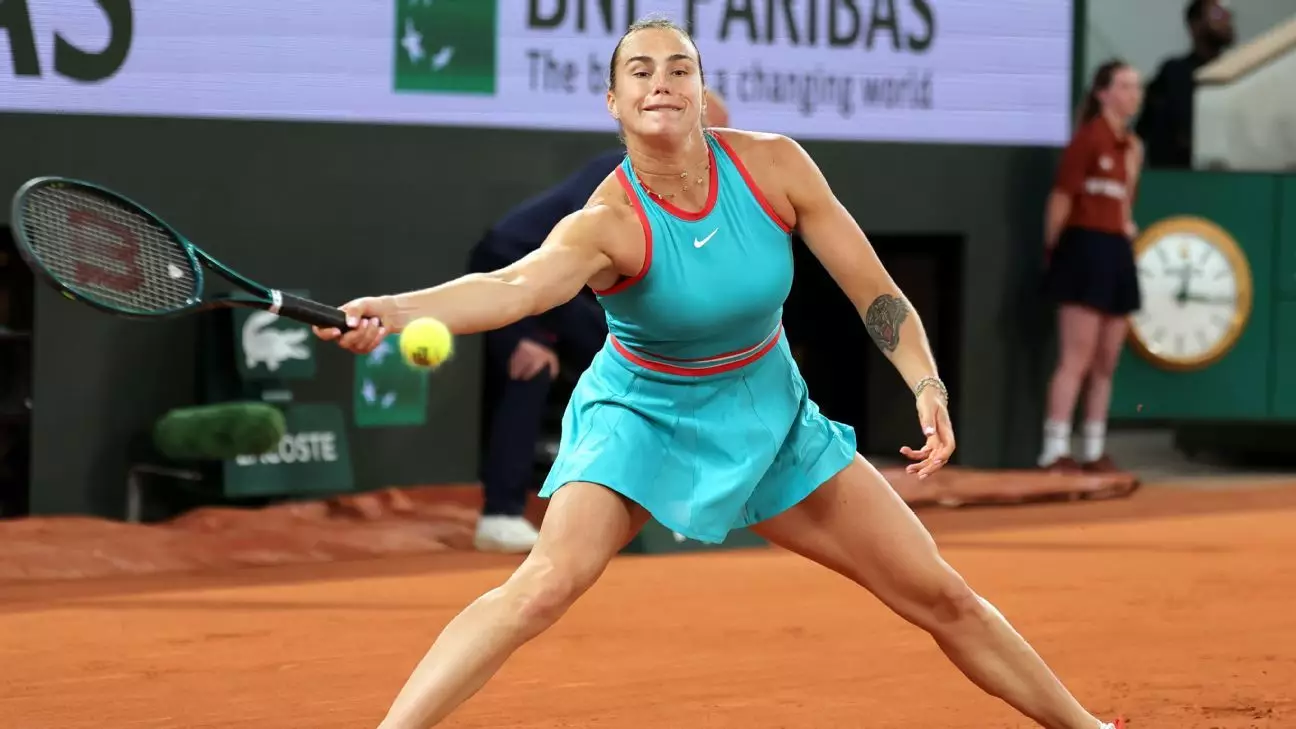The French Open, with its rich history and famed clay courts, serves as a thrilling backdrop for the world’s elite tennis players to showcase their skills. As the tournament unfolds, fans are treated to spectacular displays of athleticism and grit. In this year’s opening round, World No. 1 Aryna Sabalenka has already set the stage for an unforgettable tournament with a commanding victory over Kamilla Rakhimova. Sabalenka, a seasoned competitor with three Grand Slam titles under her belt, stormed through the match with a decisive score of 6-1, 6-0. It took her just an hour to establish dominance, sending an unmistakable signal to her competitors.
Sabalenka’s performance was marked by raw power—she notched up five aces and skillfully navigated the pressure of break points, demonstrating not only her technical prowess but also her mental fortitude. Under the spotlight of the main showcourt, her ability to maintain composure while delivering blistering serves showcases the duality of tennis: the physical battle on court paired with the psychological warfare that unfolds. Her comment, “The first rounds are always tricky,” resonates with the truth of competitive sport; even the best can struggle under pressure. Yet, as she continues her campaign, there’s a palpable sense that her experience will serve her well in the days to come.
New Faces and Rising Stars
As established players like Sabalenka seize the spotlight, the tournament also serves as a platform for emerging talent. China’s Zheng Qinwen, who experienced the thrill of Olympic glory on the same courts just a year prior, continues to harness that winning mentality. With a victory against former finalist Anastasia Pavlyuchenkova, she showcases not only her physical skill but also the mental resilience needed to thrive at the highest levels of competition. The historic weight of her Olympic win shines through as she expresses, “It is the best experience of my life so far.” This encapsulation of her journey reveals the undercurrents of motivation present in every player; despite the challenges, the promise of success keeps them pushing forward.
Moreover, the breakthrough performance of 18-year-old Victoria Mboko provides an exciting glimpse into the future of women’s tennis. In her first Grand Slam appearance, she executed a powerful game plan against seasoned opponent Lulu Sun with utmost finesse. Her top-serving speed and her fearlessness on court speak volumes about her preparation and mindset heading into such competitive arenas. At a young age, she understands the importance of adaptation—her insistence that “the more I make it seem normal, the more normal it’s going to be” is insightful. This psychological tactic could prove pivotal, as it illustrates her ambition and maturity beyond her years.
Struggles of the Veterans
While new talents are making headway, the path isn’t always smooth for established players. The exit of two-time Wimbledon champion Petra Kvitova, fresh off her return from maternity leave, serves as a stark reminder of the unpredictable nature of sport. Kvitova’s loss to Viktorija Golubic speaks volumes about the challenges faced by athletes during their comebacks. The mental struggle of regaining form, particularly after significant life changes, is a narrative that resonates in many professional careers. As she reminded herself that the journey is just as important as the destination, Kvitova’s resilience could very well lead to future triumphs.
This year’s French Open is a potent mix of exhilarating performances, inspiring comebacks, and the realities of competition. From Sabalenka’s unstoppable energy to the emerging talents making headlines, this tournament is already shaping up to be a landmark event. The clay courts will continue to be a battleground for excellence, with layers of stories unfolding round by round. Each player brings their own narrative to the table, and as fans witness the unfolding drama, one undeniable truth emerges: the essence of tennis is a blend of struggle, triumph, and the relentless pursuit of greatness.

